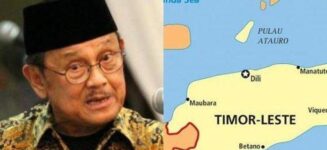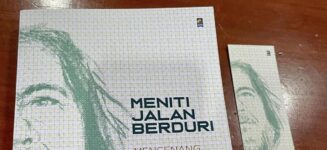Letter to the editor:
Prabowo clarifies
Published by the Jakarta Post | Opinion | Fri, December 27 2013, 11:23 AM
. . .
I am writing this response to the article entitled “Whatever happened in Kraras, Timor Leste, ‘Pak’ Prabowo?” written by Aboeprijadi Santoso, which appeared in the Dec. 20 edition of The Jakarta Post.
This essay, and specific charges relating to the tragic events at Kraras, is clearly a personal attack on my military career and personal reputation, based on unproven allegations, innuendos and third-hand reports — none substantiated, by either the United Nations or current Timor Leste authorities.
It is revealing that this issue, dealing with events that took place over 30 years ago, has been revived and finds its way into the press just 100 days before the coming Indonesian legislative election, in a manner clearly intended to cast serious doubt on me, as one of the leading candidates for the office of the president of the Republic of Indonesia.
I thus wish to protest in the strongest terms and to refute the scurrilous allegations, none of which are substantiated, contained in this article.
Let me ask you this. If indeed I am guilty of this massacre, and other such war crimes, how is it that I have been accepted and even photographed in meetings and friendly conversation with former Timor Leste president Xanana Gusmao (April 20, 2001), Lere Anan Timur (November 21, 2008) and Mari Alkatiri (June 20, 2013)?
Photographs and articles confirming this were published by the Post, which by the way should have done its homework before publishing Aboeprijadi’s article.
Would Xanana and other Timorese freedom fighters, our nation’s former enemies, have befriended an Indonesian officer truly guilty of such despicable crimes against civilians?
For the record, I insist I was nowhere near the site of the “Kraras Massacre” that occurred in Viqueque district on Aug. 8, 1983 and I seriously challenge anyone to offer proof that I was either in the vicinity or that I issued any order to abuse or kill civilians.
Neither the UN nor the government of Timor Leste have ever proffered charges of human rights violations against me, and the article in question reveals this, with its “[…]all had heard of Prabowo, but none said to have seen him in the area […]”, “allegedly involved in a number of human rights violations” and “the circumstances that led to renewed violence remain largely unclear”.
If the facts remain unclear, what is the point of bringing up this tragedy and pointing the finger at an Indonesian presidential candidate, except to undermine and cast a shadow on his electoral campaign?
In fact, my name was cleared in an investigative article by Jose Manuel Tesoro, carried in the March 13, 2000 edition of Asiaweek, which states the following:
“The question is: How far did Prabowo participate in all this? To obtain details of his alleged abuses, Asiaweek contacted four separate non-governmental organizations monitoring military atrocities. These were TAPOL in London; Solidamor in Jakarta; the HAK Foundation, headquartered in Dili; and the East Timor Action Network [ETAN] in New York. We asked for eyewitness reports, transcripts of intercepted communications, leaked papers or anything that could substantiate these stories. None could provide them.”
As a matter of fact, on many occasions I protected Falintil guerrillas taken prisoner by the Indonesian Military (TNI) and Timorese civilians from reprisals, in a complex and confused situation, where the Indonesian Army became involved in a civil conflict, one in which brother frequently stood against brother and the battle lines were unclear.
These tired and unproven rumors, as recited in this article (some three decades after the fact, conducted and written up by a journalist who apparently is well known for his grudges and animosity toward the TNI) are a matrix of lies, unsupported by history.
Ask the Timorese themselves what happened. I claim that this whispering campaign is most probably backed by an old guard of corrupt Indonesian politicians, frightened of a popular movement that appeals to the aspirations of millions of young people and the underprivileged poor, and which is determined to quash corruption and institute clean government.
Lt. Gen. (ret.) Prabowo Subianto
Jakarta
Letter to the editor:
Reply to Mr. Prabowo
Published on Facebook | Sun, December 29 2013
. . .
I should thank Mr. Prabowo Subianto for his response (The Jakarta Post Dec. 27) on my article titled “What ever happened in Kraras, Timor Leste, ‘Pak’ Prabowo?” (The Jakarta Post Dec. 20). His response, however, is deeply disappointing – a baseless denial.
First, he insists that he “was nowhere near the site of the “Kraras Massacre” that occurred in Viqueque district on Aug. 8, 1983”. That was the day when a number of hansips (local civil defense) deserted form the Indonesian army’s units stationed in Viqueque, attacked and killed 16 Indonesian soldiers.
Almost a month later, around Sept. 17, a number of massacres occured as reprisals killing about 300 unarmed locals (including those executed near the Luca, not Wituku, river). There is no doubt Prabowo was in East Timor in April and had covertly gone in and out of the country until at least August, perhaps even September.
Much throughout this period it was not clear his whereabout and what he was doing – much to the anger and worry of Col. Gatot Purwanto who was the then local commander, as he reported it to Governor Mario Carrascalao. (See Timor Archives, http://timorarchives.wordpress.com/2013/01/17/revisiting-1983/ and interview by Benedict Anderson etc with Mario Carrascalao in ‘Indonesia 76’, Cornell University, Oct. 2003. There should be more on this at the CAVR archives in Dili).
Second, he said he had never been near the site of the massacre, yet there was a report (in sources mentioned above) saying, I quote, “Prabowo went to Bibileo”. Perhaps it will be helpful to refresh his memory: do you remember the field in Bibileo with a building and a stone with this written on it: “Sekolah Dasar Negeri 08. Riun Yudha. Bibileo, Viqueque, Tut Wuri Handayani” (at the unit’s symbol)”. It’s still there.
The villagers I met were much younger in 1980s and naturally could not remember all details i.e. whether they had seen Prabowo on the days when the attacks and killings occurred in such a big field and when those events probably occurred in the afternoon or night. But why on earth could they three decades later have heard of and remember Prabowo’s name, mention it as an important name, and put a poster with his photograph in their house? I could go on with more details should Mr. Prabowo pretend to forget.
Third, Mr. Prabowo appears to be naive or pretends to be so when he said “Would Xanana and other Timorese freedom fighters, our nation’s former enemies, have befriended an Indonesian officer truly guilty of such despicable crimes..”
In doing so, he actually mistakenly transfers the issue to a political and diplomatic realm since this event, the so-called ‘friendship’, occurred – indeed could only occur – after the independence of Timor Leste. In other words, the geopolitics has dictated both sides, now those East Timorese are state officials representing their state, to act as politicians and diplomats. I happen to know and met with some of those freedom fighters when they were abroad during their struggle in the 1990’s. They certainly took a very different attitude when they mentioned Mr. Prabowo’s name. It is interesting that Mr. Prabowo now mentions them as “Timorese freedom fighters”. Had he recognized this three decades ago, the massacres might not have happened.
It should also be stressed that having fought for decades and achieved freedom, the East Timorese resistance had also learned, not only from Indonesian struggle against Dutch colonialism, but in particular from Africa i.e. the Mozambique’s and Nelson Mandela’s struggle. At this point I fully agree with Mr Abdul Khalid response to Mr. Prabowo that “The East Timorese authorities are far more tolerant to you than a number of countries in the world”.
Fourth, to conclude, the only way to resolve the controversy would be for Mr. Prabowo to honestly provide details of his assignments, his posting dates and the operations under his command in East Timor at least during the period of April to Sept. 1983.
Only then it would be fair for the Indonesian electorate, including the supporters of his political party, whether or not it is politically and morally responsible to vote for his party and his president candidacy.



